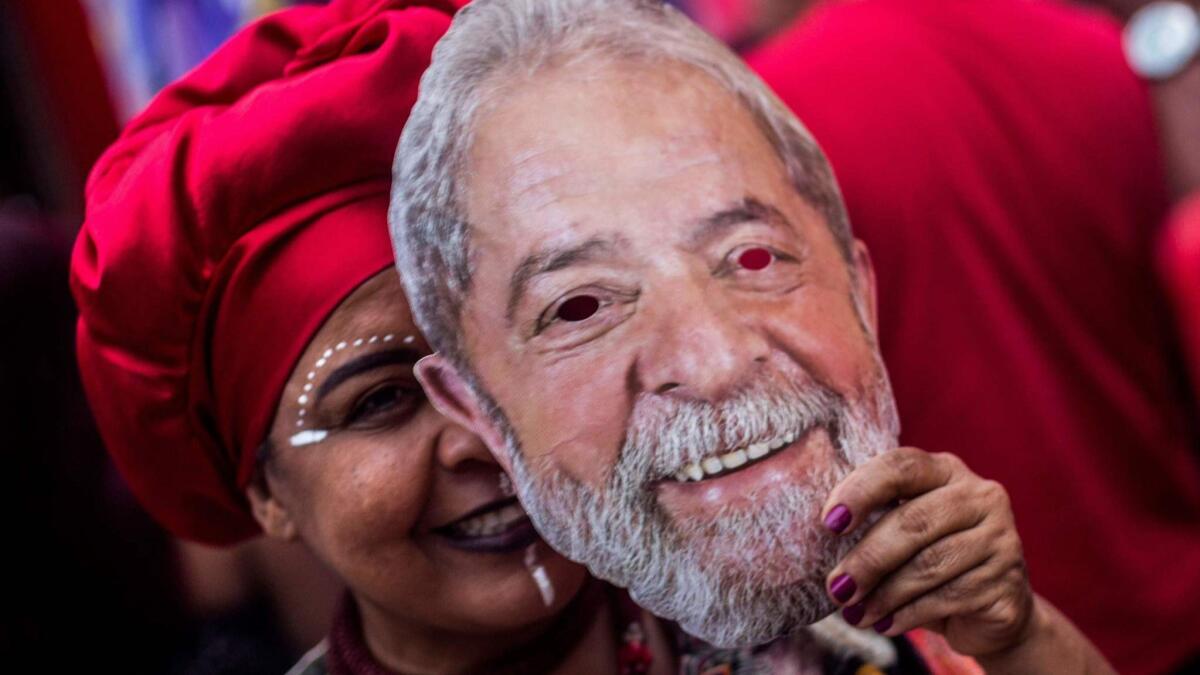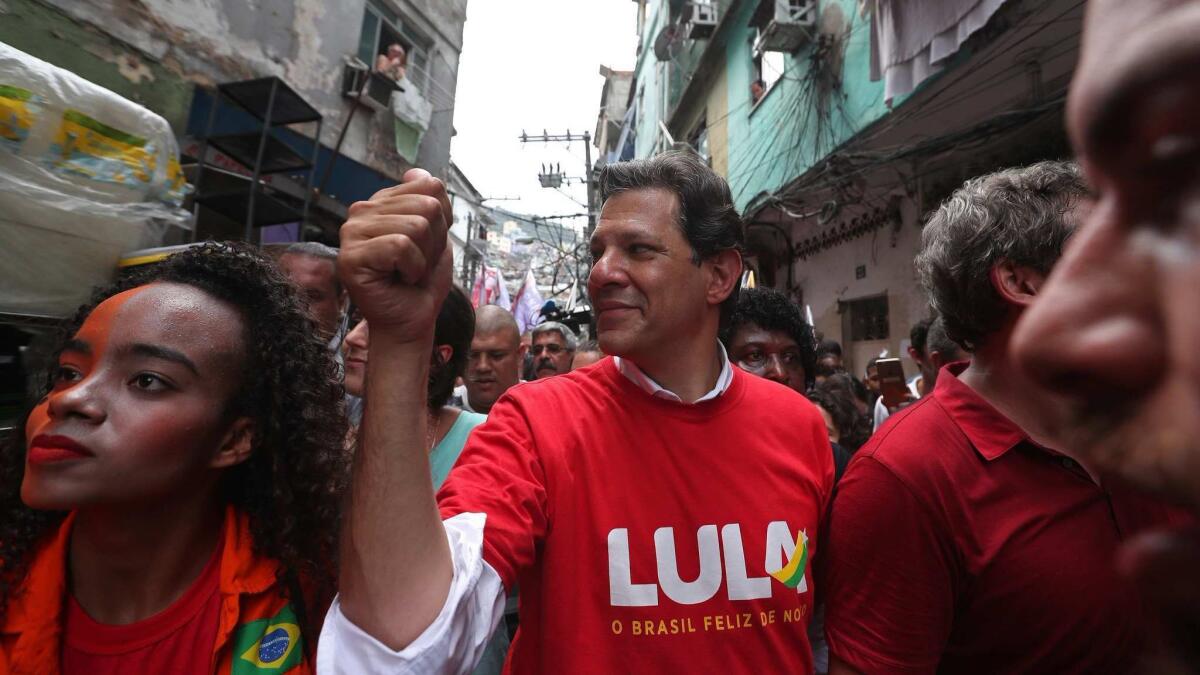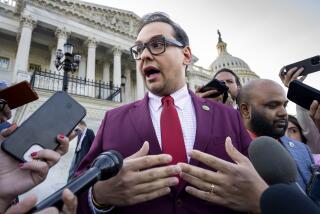In Brazil’s election, Lula’s out, his surrogate lags in polls, and a right-wing rival is rising since being stabbed

Brazilian politics has never lacked drama.
During the last 16 years, two presidents have been impeached and a third is serving a 12-year prison sentence for corruption. More than 100 other high-ranking politicians from 14 parties have been implicated in the ongoing corruption investigation known as Car Wash.
The run-up to the presidential election next month has continued the political theater.
The left-wing Workers’ Party had been poised to reclaim the presidency, which it held from 2003 until the 2016 impeachment of Dilma Rousseff. But two developments this month have flipped the odds.
First, Jair Bolsonaro, the major candidate on the right, was stabbed Sept. 6 during a rally, landing him with an extended hospital stay and an unexpected boost in the polls as he enjoys national sympathy and free television airtime.
Then on Tuesday, Luiz Inacio Lula da Silva, the convicted ex-president who had been staging a comeback from jail, was forced to pull out of the race, leaving the left in turmoil.
The vote is Oct. 7. Here’s a look at the major players.
What happened to Lula?
The former steelworker and union leader left office in 2010 with an 87% approval rating, largely for his success in dramatically reducing the poverty rate.
But in July 2017, he was found guilty of accepting $1.2 million in bribes from contractor OAS in exchange for helping the company win contracts with state-run oil giant Petrobras.
Lula maintained his innocence, but in April, after losing a series of appeals, he was ordered to report to prison.
He then spent two nights at the steelworkers union headquarters, where his supporters created a blockade to shield him from police, before turning himself in.
“The more days they leave me [in jail], the more Lulas will be born in this country,” he told the crowd.
In August, his Workers’ Party announced he was running for president, and in a poll late that month he was the clear front-runner at 39%.
That level of support reflected widespread loyalty for his efforts on behalf of the poor.
But Brazil’s top electoral court ruled this month that the so-called Clean Slate Law — which bars convicts from holding office for eight years after completing their sentences — made Lula ineligible to run.
Lula continued to insist he would be on the ballot. But on Tuesday — the deadline set by the electoral court for a replacement to be named — he passed the baton to his running mate, Fernando Haddad.

Who is Fernando Haddad?
The 55-year-old Haddad was a popular philosophy and political science lecturer at the University of Sao Paulo before entering politics.
He was an aide to the planning minister in 2005 when Lula appointed him education minister, a job he kept under Rousseff.
Haddad left that post in 2012 to run for mayor of Sao Paulo during a time when the Workers’ Party was still held in high regard. Lula’s backing clinched the win.
As mayor, he focused largely on transportation in the core of the city, adding new bus routes and bike lanes. But perceived neglect of the city’s periphery made him seem out of touch to many voters, and he lost his bid for reelection in 2016 to businessman and first-time candidate Joao Doria.
Lula has urged his supporters in the upcoming election to carry on his legacy by supporting Haddad.
“Fernando Haddad will be Lula for millions of Brazilians,” he wrote on the Workers’ Party website.
But Haddad lacks Lula’s charisma and “man of the people” appeal. He is also largely unknown outside of Brazil’s southeast.
Support for Lula does not necessarily translate to broader support for the left.
That was reflected in a poll this month by Datafolha, which showed Haddad at 13%.
Where does that leave the right?
The big winner from Lula’s removal from the race is Bolsonaro, a former army captain and a longtime conservative congressman who is known for his vocal support of torture and guns as well as his disparaging comments about women, black people and homosexuality.
Stabbed at a campaign rally in the town of Juiz de Fora, he is recovering in a Sao Paulo hospital after surgery to stop internal bleeding and repair intestinal damage.
A 40-year-old waiter named Adelio Bispo de Oliveira, who was taken from the rally and handed over to police, has confessed to the stabbing. It’s unclear whether he had a political motive. He told police that God told him to do it.
Bolsonaro has continued to campaign from his hospital bed. Daily news coverage of the attack and his recovery has given him an inordinate amount of publicity.
His competitors are concerned about fairness but don’t want to come across as unsympathetic.
The Datafolha poll this month put him in the lead with 26%.
Disgust with corruption and distrust of current political leaders has made him popular among Brazil’s wealthy, well-educated voters, particularly those between the ages of 18 and 25.
But his candidacy has also been divisive. A Facebook group called Women Against Bolsonaro has grown to more than 2.2 million members since it was created two weeks ago, and protests it has organized are expected to bring hundreds of thousands of people into the streets of Sao Paulo and Rio de Janeiro.
Bolsonaro is expected to get the most votes Oct. 7 but fall short of 50%, setting up a runoff with the second-place finisher.
What about the current president?
Michel Temer was the vice president under Rousseff and took over the top job when she was impeached. He promised to “put Brazil back on track” but instead came to represent much of what Brazilians hate about the political class.
Last year a recording surfaced that appeared to show him condoning the payment of hush money to protect a billionaire from the Car Wash corruption investigation. That was followed by the release of a video of one of his close aides receiving a suitcase full of cash.
But Congress voted 263-227 to keep him in office and avoid a corruption trial before the Supreme Court.
Temer’s austerity measures, including a pension overhaul and government spending caps, didn’t help his waning popularity, as healthcare and education were already suffering from a lack of investment.
Last month his approval rating was 4%.
Not surprisingly, he decided not join this year’s race.
Who else has a shot at the presidency?
The latest poll showed Ciro Gomes, a former mayor of Fortaleza and governor of Ceara state from the left-leaning Democratic Labor Party, tied with Haddad at 13%.
Geraldo Alckmin, a former Sao Paulo governor and pro-business centrist running as the Brazilian Social Democracy Party candidate, polled at 9%.
Marina Silva, a previous presidential candidate and environmentalist from the center-left Sustainability Network Party, had 8%.
Meanwhile, 12% of those surveyed were divided among other candidates, and 6% were undecided.
An additional 13% said they would cast blank or null ballots.
More to Read
Start your day right
Sign up for Essential California for news, features and recommendations from the L.A. Times and beyond in your inbox six days a week.
You may occasionally receive promotional content from the Los Angeles Times.






